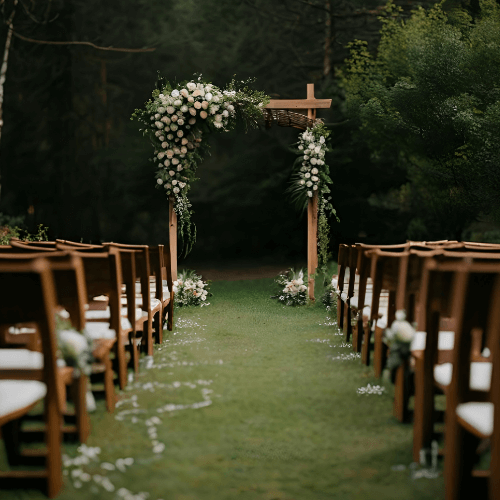
Weddings
Congratulations on your engagement!
I’m delighted to share a bit about my journey and passion for creating unforgettable, personalized wedding ceremonies. My name is Lisa and I have dedicated my life to celebrating love in all its beautiful forms.
Every couple has a unique story, and my goal is to weave your love, values, and vision into a ceremony that reflects who you truly are. Whether you envision a traditional service, a contemporary celebration, or an intimate gathering, I am committed to crafting a memorable experience that will resonate with you and your loved ones for years to come.
Beyond weddings, I offer a range of services to support you through life's journey—including vow renewals, commitment ceremonies, and other sacred milestones. With an in-depth ministerial program and 20 years of experience, I bring a depth of understanding and a touch of creativity to each event.
Every couple has a unique story, and my goal is to weave your love, values, and vision into a ceremony that reflects who you truly are. Whether you envision a traditional service, a contemporary celebration, or an intimate gathering, I am committed to crafting a memorable experience that will resonate with you and your loved ones for years to come.
Beyond weddings, I offer a range of services to support you through life's journey—including vow renewals, commitment ceremonies, and other sacred milestones. With an in-depth ministerial program and 20 years of experience, I bring a depth of understanding and a touch of creativity to each event.
What You Need to Know
Getting Your Marriage License in New York
Where to Apply
Both partners must apply in person at any town or city clerk’s office in New York State. You’ll sign the application together in front of the clerk. You will need photo ID and Birth Certificates.
👉 View full details here ➜
Both partners must apply in person at any town or city clerk’s office in New York State. You’ll sign the application together in front of the clerk. You will need photo ID and Birth Certificates.
👉 View full details here ➜
Cost
- $40 if issued outside NYC (includes Certificate of Marriage Registration)
Waiting Period
There’s a 24-hour waiting period before the ceremony can take place. This may be waived by a judge.
There’s a 24-hour waiting period before the ceremony can take place. This may be waived by a judge.
License Validity
- Valid for 60 days (or 180 days for active U.S. military)
- Must be used within New York State
Required Documents
Bring proof of age and identity, such as:
Bring proof of age and identity, such as:
- Birth certificate
- Passport or driver’s license
- Government or school-issued photo ID
Age & Eligibility
- Both parties must be 18 or older
- No close familial relationships allowed (siblings, parents, aunts/uncles, nieces/nephews)
Previous Marriages
Provide divorce or death records for any prior spouse.
Provide divorce or death records for any prior spouse.
Ceremony & Officiants
Ceremonies must be performed by an authorized officiant (clergy, judge, mayor, or registered officiant).
At least one witness is required.
Ceremonies must be performed by an authorized officiant (clergy, judge, mayor, or registered officiant).
At least one witness is required.
Copies of Marriage Records
- From the issuing clerk’s office: $10
- From NY State Dept. of Health: $30
New York State Department of Health
Bureau of Vital Records, PO Box 2602, Albany, NY 12220-2602
Bureau of Vital Records, PO Box 2602, Albany, NY 12220-2602
 | Congratulations on Your Engagement!This quick form helps us check availability for your wedding date and gather a few details about you and your plans, so we can make sure everything aligns perfectly. Just fill in your info, share your wedding date, and we'll get back to you soon with options that fit your vision—start by clicking here to begin. |


